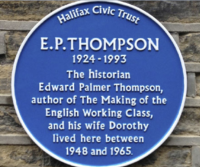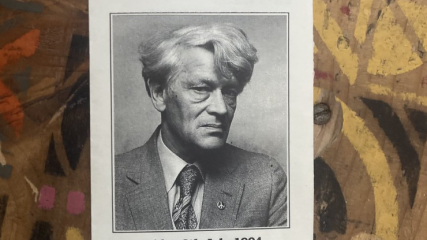Events, accolades mark the centenary of the birth of EP Thompson (m.1941)
This month marks the centenary of the birth of Corpus alumnus Edward Palmer (EP) Thompson (m.1941), historian, author and political activist. Thompson was a key figure of the left, a socialist critic and a long-time campaigner for peace and the Campaign for Nuclear Disarmament.
Thompson, who was born on 3 February 1924 in Oxford, matriculated at Corpus in 1941, but left a year later to join the army, serving in a tank unit in Italy. After the war he returned to Corpus to study History. He was tutored by Fellow Kenneth Pickthorn, President of Corpus from 1937-44 and Conservative MP. Very much in contrast to his Tutor, Thompson was described by fellow student John Fitch (m.1941) as a 'red-hot socialist'.
Thompson graduated in 1946 and was thereafter critical of his Cambridge experience, saying in a 1992 interview with Penelope Corfield that he wasn't well-taught in Cambridge and "the less said about that the better." In Corpus Within Living Memory, his contemporary John Press (m.1938) remembers Thompson having 'almost unmitigated contempt' for the Part II History Tripos paper 'The Theory of the Modern State', quoting him as saying "I saw Mussolini hanging upside down in a Milan square, and after that it is clear that Bosanquet and the Victorian idealists are talking academic piffle."
Whilst in Cambridge Thompson joined the British Communist Party and subsequently formed the Communist Party Historians Group with Eric Hobsbawm and others. He ultimately left the Party in 1956 over the suppression of the Hungarian uprising but remained a life-long 'man of the Left', co-founding the journal The New Left Review and dedicating his life to social and political activism, writing and campaigning.
In 1944, Thompson's brother William Frank, also a communist who was in the British Army, was shot by the Germans for aiding Bulgarian anti-fascists. With his mother Theodosia, Thompson wrote There is a Spirit in Europe: A Memoir of Frank Thompson from Frank's letters and diaries. In 1948 Thompson married a fellow communist, historian and scholar of the 19th-century Chartist movement, Dorothy Sale; their marriage was to be an enduring intellectual and activist partnership. The couple had three children, one of whom is the children's author Kate Thompson.
After Cambridge
On leaving Cambridge, Thompson travelled with Dorothy to Tito's Yugoslavia to build the 'Youth Railroad', and then settled in Halifax, West Yorkshire where he taught evening classes at the University of Leeds. His first book, published in 1955, was a biography of William Morris, the 19th-century socialist activist and key figure in the Arts and Crafts Movement.
Over the next four decades, Thompson wrote essays, academic papers and books about employment, socialism, capitalism and class, particularly through the changing conditions of the industrial working class in the 18th and 19th centuries. A pioneer of social history, Thompson coined the phrase "writing history from below" to describe his approach of exploring the everyday experiences of working people. His best-known work, The Making of the English Working Class, was published in 1963. Writing in The Guardian recently, the journalist Kenan Malik describes stumbling across the book, saying, "I can still sense the thrill in opening the book and reading the first paragraph: 'The working class did not rise like the sun at an appointed time. It was present at its own making.' I did not know it was possible to write about history that way." Thompson contended that working people were not merely victims of historical forces but individuals with consciousness of their condition and agency in determining their own place in the economic and cultural life of the country.
In addition to his writings, Thompson was a life-long activist for socialism, chairing peace committees, campaigning against war, and waging intellectual battles against Stalinist Marxism, the 'vacant theorism' of French deconstructionists, and modernism. He became Director of the Centre for the Study of Social History at Warwick University in 1965, but resigned in protest in 1971, writing the book Warwick University Ltd: Industry, Management and the Universities, in which he argued that Warwick and higher education in general was being hijacked by commercial interests.
Thompson travelled and lectured widely. In the late 1970s, Thompson became involved with the anti-nuclear movement, to which he devoted much of his energies for the next decade. In 1986 he made an appearance at Glastonbury - an unlikely headliner - where he extolled England as not just a capitalist state but an alternative nation of inventors and artists. In the article 'William Blake and Glastonbury' in History Extra, Professor and filmmaker Michael Wood writes "I remember when EP Thompson took to the Pyramid Stage at Glastonbury - one of the great moments in the history of the festival, according to [festival founder] Michael Eavis. Thompson refused to be filmed by the BBC, which he felt was essentially an arm of the Conservative state. Talking backstage, though, I persuaded him, and he later asked for that footage to be played at his funeral." A short excerpt of Thompson's appearance can be seen on YouTube.
EP Thompson died on 28 August 1993 at the age of 69. His last book, published posthumously, was Witness Against the Beast: William Blake and Moral Law. Thompson can be seen in this lecture from 1970 discussing Blake's poem London.
Marking the Centenary
In December 2023, BBC 3's The Essay produced five programmes on The Making of EP Thompson: The Enormous Condescension of Posterity. The programmes included Geoff Andrews discussing the ways in which Thompson's experience as an adult education tutor influenced his work, 'On Reading The Making of the English Working Class', and 'Those Thompson Left Behind'.
Numerous journals and newspapers noted the centenary, including this interview by Tribune Magazine with Jeremy Corbyn, John McDonnell and Kate Hudson. In the online publication Unherd, Cambridge student Samuel Rubinstein wrote a piece entitled EP Thompson, Marxist Rebel, and Dominic Alexander published EP Thompson: historian for the working class for Counterfire.
On Sunday 3 February 2024, when Thompson would have turned 100, an event was held in Halifax by the Calderdale Trades Union Council with support from the Society for the Study of Labour History, Yorkshire CND and the Independent Working Class Education Network - a group of sponsors that testify to his lasting influence with the labour movement.
Thompson lived in Halifax for 17 years, and a commemorative blue plaque is mounted on the home he shared with Dorothy at Holly Bank, Siddal.
More on EP Thompson
Thompson appeared on the BBC programme Desert Island Discs with Sue Lawley in 1991. Amongst his chosen music were songs by Paul Robeson and Derek Bell; his chosen book was Songs of Innocence and Experience by William Blake.
A 2020 podcast by Jacobin Radio called Casualties of History worked its way through The Making of the English Working Class.
The Making of the English Working Class is still in print, 60 years after its publication. A digital version can be found on the University VLeBook platform by searching on Cambridge University Library's iDiscover.


